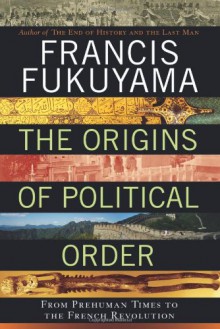The Origins of Political Order: From Prehuman Times to the French Revolution
Virtually all human societies were once organized tribally, yet over time most developed new political institutions which included a central state that could keep the peace and uniform laws that applied to all citizens. Some went on to create governments that were accountable to their...
show more
Virtually all human societies were once organized tribally, yet over time most developed new political institutions which included a central state that could keep the peace and uniform laws that applied to all citizens. Some went on to create governments that were accountable to their constituents. We take these institutions for granted, but they are absent or are unable to perform in many of today’s developing countries—with often disastrous consequences for the rest of the world.Francis Fukuyama, author of the bestselling The End of History and the Last Man and one of our most important political thinkers, provides a sweeping account of how today’s basic political institutions developed. The first of a major two-volume work, The Origins of Political Order begins with politics among our primate ancestors and follows the story through the emergence of tribal societies, the growth of the first modern state in China, the beginning of the rule of law in India and the Middle East, and the development of political accountability in Europe up until the eve of the French Revolution.Drawing on a vast body of knowledge—history, evolutionary biology, archaeology, and economics—Fukuyama has produced a brilliant, provocative work that offers fresh insights on the origins of democratic societies and raises essential questions about the nature of politics and its discontents.
show less
Format: hardcover
ISBN:
9780374227340 (0374227349)
Publish date: April 12th 2011
Publisher: Farrar, Straus and Giroux
Pages no: 585
Edition language: English

This is my first foray into political science, which maybe explains why I took so long to read it. Occasionally, I got lost in Fukuyama's analysis until his thesis reasserted itself. In retrospect, it's an impeccably organized book, comparing the history of political development in four broad geogra...

The author does a definitive survey of political development through out the world while avoiding the ODTAA ("one dang thing after another") trap survey books of this kind can often fall into. This kind of information often pops up in many of the books I read, but is never covered as a primary topic...






 9 years ago
9 years ago




 11 years ago
11 years ago